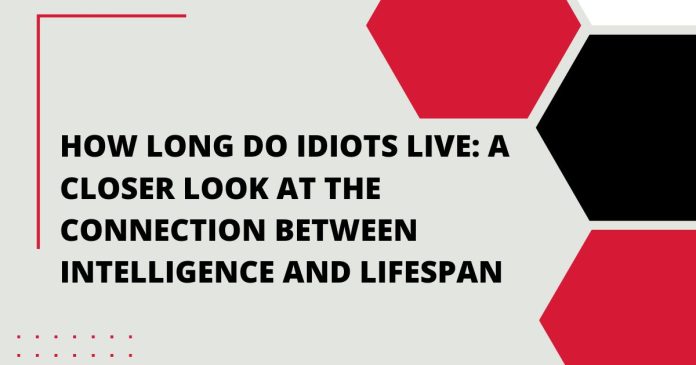Introduction
Intriguing as it may be, the question of how long do idiots live might appear straightforward on the surface, but a deeper exploration reveals a complex interplay between intelligence, health, lifestyle choices, and various other factors that impact human lifespan. In this article, we delve into the curious relationship between intelligence and longevity, shedding light on recent research findings, dissecting the factors involved, and debunking common misconceptions.
The Link Between Intelligence and Longevity
Defining Intelligence and Idiocy
Before we embark on this exploration, it’s crucial to clarify what we mean by “intelligence” and “idiocy.” Intelligence encompasses a range of cognitive abilities, including problem-solving, reasoning, learning, and adaptability. On the other hand, idiocy, an outdated term, is often used pejoratively to refer to individuals with significantly below-average cognitive functioning.
The Surprising Findings
Research in the past has hinted at a potential correlation between higher intelligence and increased lifespan. Studies have suggested that individuals with higher cognitive abilities tend to make better lifestyle choices, such as avoiding smoking and excessive alcohol consumption, which contribute to their longer life expectancy.
Unraveling the Factors
Lifestyle Choices
Lifestyle choices play a pivotal role in determining how long individuals live. Intelligent individuals, often armed with better decision-making skills, are more likely to adopt healthier habits, exercise regularly, and maintain a balanced diet. These practices contribute significantly to their overall well-being and longevity.
Socioeconomic Status
Another factor worth considering is socioeconomic status. Higher intelligence often leads to better educational attainment and increased earning potential. This, in turn, enables access to better healthcare facilities, quality nutrition, and a safer living environment, all of which contribute to an extended lifespan.
Genetic Predisposition
Genetics also play a crucial role in determining longevity. While intelligence is not directly tied to genes that influence lifespan, certain genetic factors may contribute to both cognitive abilities and overall health, indirectly affecting how long an individual lives.
Dispelling Misconceptions
The Notion of “Idiocy”
It’s important to address the term “idiocy” with sensitivity. Using such labels oversimplifies the complexity of human cognition and can perpetuate stigmas. People with lower cognitive abilities might face challenges, but they can lead fulfilling lives and make positive contributions to society.
Correlation ≠ Causation
While studies suggest a correlation between intelligence and lifespan, it’s vital to remember that correlation does not imply causation. Higher intelligence does not directly cause longer life; rather, it is often associated with behaviors and circumstances that promote well-being.
Conclusion
In conclusion, the relationship between intelligence and lifespan is multifaceted and influenced by a myriad of factors. While higher intelligence seems to be associated with longer lifespans due to better lifestyle choices, socioeconomic advantages, and genetic predispositions, it’s important to avoid oversimplification and stigmatization. Understanding the complexity of this topic encourages empathy and a broader perspective on human diversity.
FAQs
- Is there a definitive link between intelligence and lifespan? Research suggests a correlation, but causation is not established.
- Can lifestyle changes improve lifespan for everyone? Adopting healthier habits can benefit anyone, regardless of intelligence.
- Why is the term “idiocy” problematic? It oversimplifies cognitive differences and perpetuates negative stereotypes.
- Do genetics play a significant role in determining lifespan? Genetic factors contribute, but they interact with other variables.
- What’s the key takeaway from this article? Intelligence is just one of many factors influencing lifespan; diversity should be embraced.

